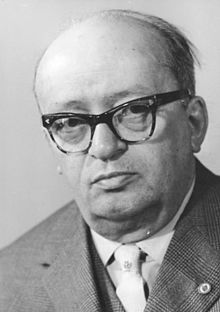Friedrich Ebert (junior)
| Friedrich Ebert, Jr. | |
|---|---|
 |
|
| 1st Lord Mayor of East Berlin | |
|
In office 30 November 1948 – 5 July 1967 |
|
| Preceded by | Office established |
| Succeeded by | Herbert Fechner |
| Personal details | |
| Born |
12 September 1894 Bremen, German Empire |
| Died | 4 December 1979 (aged 85) East Berlin, German Democratic Republic |
| Citizenship | East German |
| Nationality | German |
| Political party | Socialist Unity Party |
| Occupation | Printer, journalist |
Friedrich "Fritz" Ebert, Jr. (12 September 1894 – 4 December 1979) was a German politician and East German communist official, the son of Germany's first President Friedrich Ebert.
He was originally a Social Democrat like his father before him, but is best known for his role in the origins of the Socialist Unity Party of Germany and the German Democratic Republic, in which he served in various positions.
Born in Bremen, Fritz Ebert underwent an apprenticeship as a printer from 1909 to 1913. In 1910 he joined the Socialist Workers' Youth and in 1913 the SPD. From 1915 to 1918 he fought in the First World War. During the Weimar Republic, he worked for various social democratic newspapers.
In 1933, he was arrested for illegal political activity and detained for eight months in various concentration camps, e.g. Oranienburg and Börgermoor. In 1939, he was conscripted into the army. In 1940, he worked at the Reichsverlagsamt (publishers' office). Until 1945 he was under constant police surveillance.
After the demise of the Third Reich, he was elected chairman of the SPD in the Prussian province of Brandenburg. Being the son of a former President made Ebert one of the foremost political leaders in East Germany. His role in this period can be compared with that of Jan Masaryk in post-war Czechoslovakia. Ebert was courted by the leaders of the Communist Party (KPD), who were aiming for unification of the much larger SPD with the smaller KPD. They wanted to use his father's supposed role in the breaking-up of the unity of the German working class in 1918 to get the young Ebert's support for the unification.
...
Wikipedia
